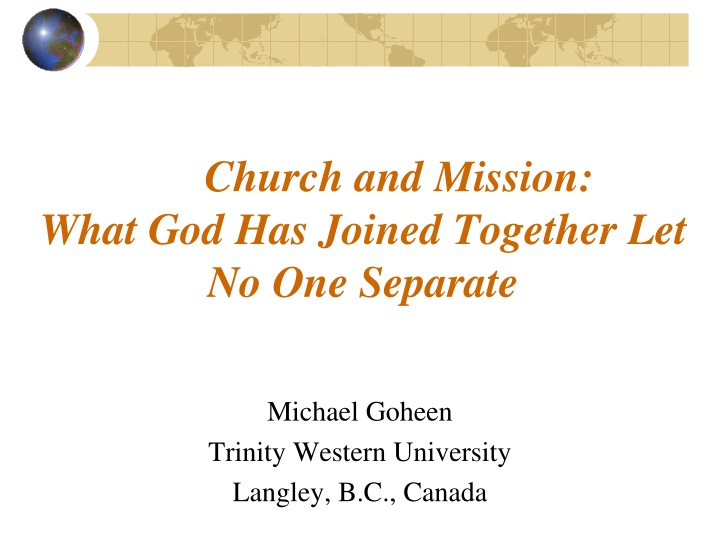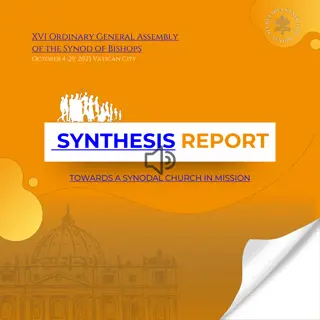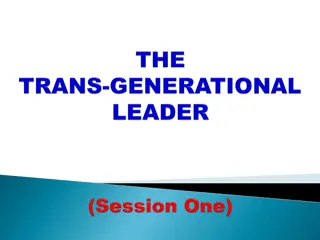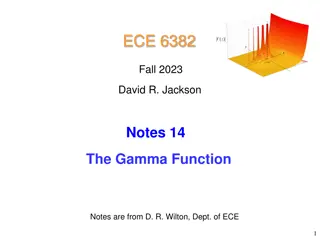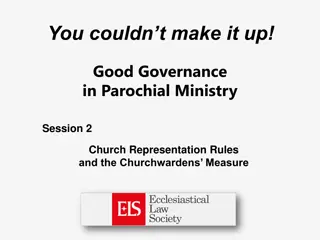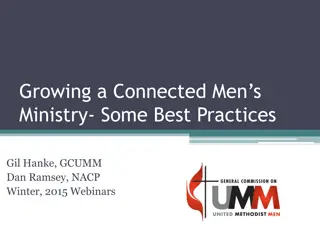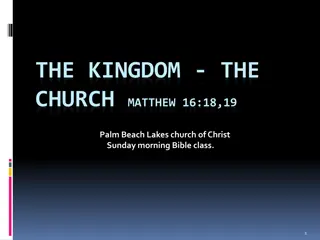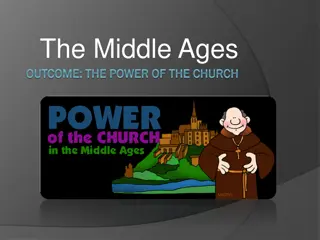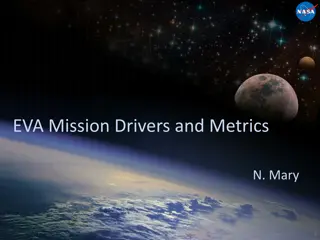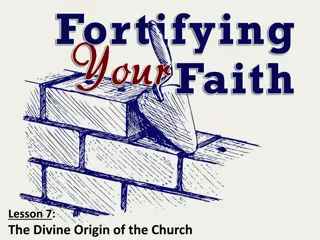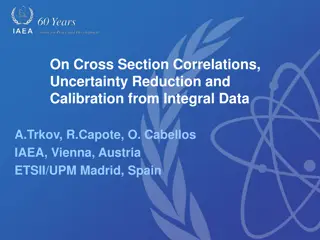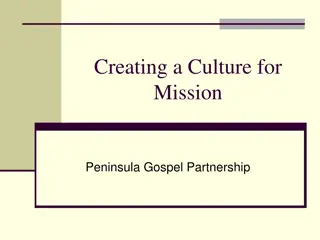The Integral Connection between Church and Mission: A Historical Perspective
The pivotal relationship between church and mission has been a central focus in the history of missionary work, with the division between them seen as a significant drawback. The emergence of missionary societies as separate entities from the church has led to deformities and challenges in fulfilling the joint mission. The critical need to unite mission and church for effective propagation of the Gospel is emphasized in this insightful examination.
Download Presentation

Please find below an Image/Link to download the presentation.
The content on the website is provided AS IS for your information and personal use only. It may not be sold, licensed, or shared on other websites without obtaining consent from the author.If you encounter any issues during the download, it is possible that the publisher has removed the file from their server.
You are allowed to download the files provided on this website for personal or commercial use, subject to the condition that they are used lawfully. All files are the property of their respective owners.
The content on the website is provided AS IS for your information and personal use only. It may not be sold, licensed, or shared on other websites without obtaining consent from the author.
E N D
Presentation Transcript
Church and Mission: What God Has Joined Together Let No One Separate Michael Goheen Trinity Western University Langley, B.C., Canada
The separation of these two things [mission and church] which God has joined together must be judged one of the great calamities of missionary history, and the healing of this division one of the greatest tasks of our time. - Lesslie Newbigin
Emergence of missionary societies Parachurch mission organisations as primary instrument of missions Emerged in the 18thcentury and exploded in first half of 20thcentury Blindness and hostility of church to missionary calling E.g., William Carey, 1792, Particular Baptist Society for Propagating the Gospel among the Heathen
Church blind to missionary calling . . . Christendom context: Non-missionary consciousness Christendom was a self-contained supposedly Christian world and the sense that the Church is a body sent into all the world . . . and existing for the sake of those beyond its borders, no longer played an effective part in [the church s] thinking. (Newbigin)
Church blind to missionary calling . . . Christendom context: Non-missionary consciousness Christendom context: Non-missionary churchmanship The period in which our thinking about the Church received its main features was the period in which Christianity had practically ceased to be a missionary religion. . . . It was in this period, when the dimensions of the ends of the earth had ceased to exist as a practical reality in the minds of Christians, that the main patterns of churchmanship were formed. (Newbigin)
Evaluate emergence of missionary societies? As so often happens, the correction of a deformity in the Church was itself deformed by its opposition to that which it sought to correct. The New Testament knows of only one missionary society the Church. The eighteenth century knew Churches which had totally ceased to be missionary societies and saw the birth of missionary societies which made no claim to be Churches (Newbigin).
Deformities arising from emergence of mission societies Mission and church separated Church and mission designate two different bodies Mission body responsible for propagation of gospel Church a different body devoted to worship and nurture of members the church was defined in terms of what happens inside its four walls, not in terms of its calling in the world. (Bosch) church becomes an introverted body, concerned with its own welfare rather than with the Kingdom of God. (Newbigin)
Mission and Church: Two Different Bodies Younger churches Mission responsible for propagating gospel Churches receptacles into which converts placed for safekeeping The congregation is bound to draw the obvious conclusion, cease to concern itself with the rest of the village, and become a body concerned only with its own welfare. (Newbigin)
Mission and Church: Two Different Bodies Younger churches Older churches Mission business of full-time specialists Church supports mission as worthy enterprise with giving, prayer, etc. Mission no longer raison d tre of congregation
Deformities arising from emergence of mission societies Mission and church separated Mission reduced to intentional cross- cultural propagation of the gospel
Mission and Church in Scripture Derivation of word mission Starting with the church in Antioch (Acts 11, 13) Careful to put in context of Acts and the biblical story
Beginning of mission in Acts . . . modern commentators help to perpetuate a Christendom reading of the Acts account by the way they divide up the material and insert editorial heads and commentary that draw on modern practice and assumptions. . . . [they] introduce the term mission at the beginning of the Gentile mission (Acts 13) (Wilbert Shenk) In Luke s account, it is the first part of Acts that founds mission. In our haste to get to Paul, we sometimes tend to see this first part only as fumbling and groping for mission, while the Pauline apostolate will be true full-fledged mission. (Lucien Legrand)
Mission and Church in Scripture Derivation of word mission Starting with the church in Antioch (Acts 11, 13) Careful to put in context of Acts and the biblical story Distinction between organic mode of mission (Acts 11:19-26) and the sending mode (Acts 13:1-3)
Organic and sending modes of mission (Shenk) In the organic mode a local congregation challenged the regnant plausibility structure of their culture on the basis of the claims of the reign of God. . . . Witness to God s reign, present and coming, was at the heart of the disciple community s life. The church grew organically. . . . this mode has been the main vehicle of the expansion of the church historically and is an authentic outworking of the Great Commission. In the sending mode certain individuals were set apart for an itinerant ministry that would enable the faith to spread to key cities and regions throughout the Roman world. . . . The Great Commission continually holds this dimension [of mission] before the church. (Shenk)
In Acts Past two centuries mission has been reduced to sending mode thus eclipsing missional calling of the church Our tendency to read the last half of Acts as a series of three missionary journeys of Paul something not found in ancient or medieval commentaries derives not from a careful reading of Acts so much as from imposing on the text a model of mission that dominated the 19th and 20th centuries (Justo Gonz lez) Nevertheless, Acts 13:2-3: central New Testament paradigm for missions (Newbigin) Place text in context of Acts, and Acts in the biblical story
Biblical story Biblical story tells story of God s mission to restore the whole creation and all of the life of humankind Fundamentally, our mission (if it is biblically informed and validated) means our committed participation as God s people, at God s invitation and command, in God s own mission, within the history of God s world for the redemption of God s creation. (Chris Wright)
Beginning with the Old Testament When we speak about the Church as the people of God in the world and enquire into the real nature of this Church, we cannot avoid speaking about the roots of the Church which are to be found in the Old Testament idea of Israel as the people of the covenant. So the question of the missionary nature of the Church, that is, the real relationship between the people of God and the world, cannot be solved until we have investigated the relation between Israel and the nations of the earth (Johannes Blauw).
Biblical Story Abraham covenant (Gen.12.2-3) Backdrop of creation and sin What is being offered in these few verses is a theological blueprint for the redemptive history of the world . . . (William Dumbrell) Twofold agenda (Paul Williamson) Formation of a people So that all nations on earth might be blessed Blessed to be a blessing: Recipient then mediator Chosen for the sake of the nations (Gen. 18.18-19)
Biblical Story Abraham covenant (Gen.12.2-3) Mosaic covenant (Ex.19.3-6) Special treasure, priestly kingdom, holy nation Israel is to be a people set apart, different from all other people by what they are and are becoming a display people, a showcase to the world of how being in covenant with Yahweh changes a people. (John Durham) Torah (Ex.20-23) Backward, forward, outward Public display: the visibility of Israel was part of its theological identity and role as the priesthood of yhwh among the nations. (C. Wright) (cf. Ezek. 5.5) Centripetal mission
Mission of Gods people God s mission involves God s people living in God s way in the sight of the nations. (C. Wright) . . . mission is not primarily about going. Nor is mission primarily about doing anything. Mission is about being. It is about being a distinctive kind of people, a countercultural . . . community among the nations. (Howard Peskett and Vinoth Ramachandra) The history of Israel from this point on [after Mosaic covenant] is in reality merely a commentary upon the degree of fidelity with which Israel adhered to this Sinai-given vocation. (Dumbrell)
Biblical Story Abraham covenant (Gen.12.2-3) Mosaic covenant (Ex.19.3-6) Covenant breaking and covenant renewal Israel s continuing failure Prophetic promises to renew covenant End-time kingdom Eschatological shepherd Gather people Renew people Fulfil calling: Gentiles stream to Zion (e.g., Zech. 8.23)
Gathered and renewed For I will take you out of the nations; I will gather you from all the countries and bring you back into your own land. I will sprinkle clean water on you, and you will be clean; I will cleanse you from all your impurities and from all your idols. I will give you a new heart and put a new spirit in you; I will remove from you your heart of stone and give you a heart of flesh. And I will put my Spirit in you and move you to follow my decrees and be careful to keep my laws (Ezek. 36:24-27).
Biblical Story Abraham covenant (Gen.12.2-3) Mosaic covenant (Ex.19.3-6) Covenant breaking and covenant renewal Jesus mission: Gathering and renewing a community to take up missional calling
Jesus gathers and renews a community to take up their missional calling . . . the only significance of the whole of Jesus activity is to gather the eschatological people of God. (Joachim Jeremias) That God has chosen and sanctified his people in order to make it a contrast-society in the midst of the other nations was for Jesus the self-evident background of all his actions. In Jesus we see God s eschatological action to restore or even re-establish his people, in order to carry out definitively and irrevocably his plan of having a holy people in the midst of the nations. (Gerhard Lohfink) Eschatological shepherd gathering lost sheep of Israel Restoring them to their missional calling Death, resurrection, Pentecost: Renewal of people
Biblical Story Abraham covenant (Gen.12.2-3) Mosaic covenant (Ex.19.3-6) Covenant breaking and covenant renewal Jesus mission: Gathering and renewing a people to take up their missional calling Gathered eschatological people commissioned and sent
Commissioning of eschatological people (Matt.28.18-20; Jn.20.21) Not a task assigned to individuals; it is an identity given to a community Great Commission is a foundational ecclesiological statement, for it is addressed to the disciple community, not autonomous individuals. (Shenk) New direction: Centrifugal In this go to all nations there lies therefore the distinctive turning-point, the great change of direction of the gospel, indicating and prepared by earlier declarations of Jesus but now coming into effect. (C. Wright) People take a new form . . . the renewed-Israel people, now transformed through Jesus and the Spirit into a multi-ethnic, non-geographically-based people charged with a mission to the whole world.
Churchs life is in its sending Commission is the launching of the church. It is a movement launched into the public life of the world. It has no life except in this sending. . . . the church . . . [is] a body thrust out in to the world to draw all people to Christ. The church s being is in that sending. (Newbigin)
Biblical Story Abraham covenant (Gen.12.2-3) Mosaic covenant (Ex.19.3-6) Covenant breaking and covenant renewal Jesus mission: Gathering and renewing a people to take up their missional calling Gathered eschatological people commissioned and sent Acts: Mission of eschatological people
Acts: Mission of eschatological people How will nations be gathered into people of God? Acts 1.8: Programmatic text Era of gathering Witnessing community: Identity of church The point is that an entire people give witness to God s plan for the world. . . . The entire New Testament sees the church as a contrast-society which stands in contrast to the world. (Lohfink) Be the witness, do the witness, say the witness (Guder) Empowered and renewed by Spirit To the ends of the earth
Jews first, then Gentiles We have to do with two successive events, first the call to Israel, and subsequently the redemptive incorporation of the Gentiles into the kingdom of God. (Jeremias) It is first of all a matter of winning Israel for the Gospel; and then Israel, believing, would become a light to the nations. (Johannes Munck)
Movement to nations Gathering Israel: Acts 2.42-47 Devoted to means that nourish new life (v.42) Manifestation of attractive life (v.42-47) Drawing scattered Israel to faith (v.47) Gathering Gentiles: Acts 11, 13 Evidence of the grace of God (11.23) Great number of people were brought to the Lord (11.24) Sent Paul and Barnabas to establish witnessing communities in areas where there was none (13.1-3) Pauline pattern
Spontaneous expansion of the church Irresistible attraction of their communal life Spontaneous evangelistic activity of the local congregation Planting of more of these congregations in new places - Roland Allen
Conclusions from biblical story Church is community charged with mission Mission is central to church s identity Mission is ecclesial Because the church and mission belong together from the beginning, a church without mission or a mission without the church are both contradictions. Such things do exist, but only as pseudostructures. (Carl Braaten) Mission broader than cross-cultural missions People who embody God s purposes (forward, backward, outward) Being (gathered and scattered), doing, speaking Mission includes missions Plant these communities everywhere as witness Necessary aspect of church s mission Ultimate horizon of church s mission
How shall we then live? Need to recover our missional identity Mission is not a fringe activity of a strongly established Church, a pious cause that [may] be attended to when the home fires [are] first brightly burning. . . . so am I sending you the very word send means mission and so the whole Church is on mission, and cannot be otherwise. . . . Missionary activity is not so much the work of the Church as simply the Church at work. (John Power) Theologically: J rgen Moltmann: Mission can renew our ecclesiology Hendrikus Berkhof: Need to revise our ecclesiology Congregationally: Gathered life (leadership, structures, worship, etc.); activities in world (evangelism, mercy, justice, callings in culture, missions); relation to culture
How shall we then live? Need to recover our missional identity Need to see missions as necessary part and as ultimate horizon of church s mission . . . every church, however small and weak, ought to have some share in the task of taking the gospel to the ends of the earth. Every church ought to be engaged in foreign missions. This is part of the integrity of the gospel. We do not adequately confess Christ as the Lord of all men if we seek to be his witnesses only among our neighbours. We must seek at the same time to confess him to the ends of the earth. The foreign missionary enterprise belongs to the integrity of our confession (Newbigin).
How shall we then live? Need to recover our missional identity Need to see missions as necessary part and as ultimate horizon of church s mission Need to struggle with our terminology Need to see mission/missions as partnership among churches Mission in, from, to all six (or seven?) continents Home base and mission field is everywhere Need to ask how mission organisations can aid mission of the church
